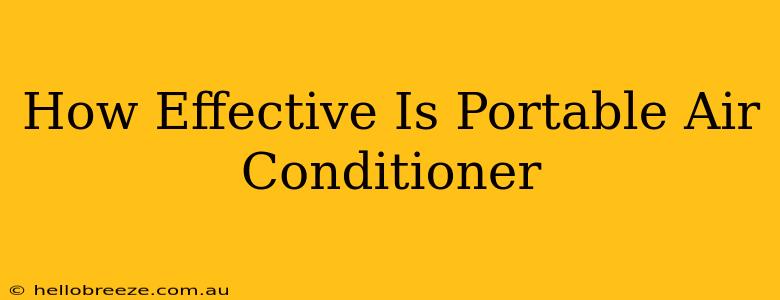Summer heat can be unbearable. A portable air conditioner offers a tempting solution – cooling down your space without the hassle (and cost!) of installing a window unit or central air. But how effective are these convenient units, really? Let's delve into the effectiveness of portable air conditioners, exploring their pros, cons, and how to maximize their cooling power.
Understanding Portable AC Effectiveness
The effectiveness of a portable air conditioner depends on several factors. It's not a simple yes or no answer; instead, it's a nuanced evaluation based on your specific needs and expectations.
Factors Affecting Effectiveness:
-
Room Size: Portable AC units have a specific BTU (British Thermal Unit) rating, indicating their cooling capacity. A unit with insufficient BTUs for the room size will struggle to cool effectively. Oversized units are also less efficient, cycling on and off frequently. Accurate measurement of your room's square footage is crucial for selecting the right BTU rating.
-
Insulation and Sealing: Poorly insulated rooms and leaky windows will significantly reduce the effectiveness of any air conditioner, portable or otherwise. Heat will constantly seep in, overwhelming the unit's capacity. Improving insulation and sealing windows and doors is vital for optimal performance.
-
Direct Sunlight: Direct sunlight pouring into a room can significantly increase the temperature, making it harder for the portable AC to keep up. Closing blinds or curtains during peak sun hours can drastically improve cooling efficiency.
-
Unit Placement: Position your portable AC away from heat sources like direct sunlight, ovens, and other appliances. Ensure adequate ventilation around the unit for proper exhaust. Proper placement is essential for efficient operation and longevity.
-
Maintenance: Regular maintenance, including cleaning the filter and coils, is crucial for maintaining peak performance. A clogged filter restricts airflow and reduces cooling capacity. Regular cleaning is vital for maximizing effectiveness and extending the unit's lifespan.
-
Type of Portable AC: There are different types of portable ACs on the market. Some use more energy-efficient methods than others. Research the latest technologies available to ensure you get the best unit for your needs.
Pros and Cons of Portable Air Conditioners
Pros:
- Portability: The biggest advantage! Easily move the unit from room to room as needed.
- No Installation: No professional installation is required; simply plug it in and go.
- Cost-Effective (Initially): Generally less expensive upfront than window or central air conditioning systems.
Cons:
- Less Efficient than Window or Central AC: They tend to be less energy-efficient and may not cool as effectively as other types of air conditioners.
- Noise Level: They can be noisy, especially at higher cooling settings.
- Exhaust Hose: Requires an exhaust hose to vent hot air outside, which can be inconvenient.
- Limited Cooling Capacity: May not be suitable for large rooms or spaces with poor insulation.
Maximizing the Effectiveness of Your Portable AC
- Choose the Right BTU Rating: Carefully calculate your room's square footage and select a unit with the appropriate BTU rating.
- Improve Room Insulation: Seal windows and doors, and add insulation where needed.
- Minimize Direct Sunlight: Close blinds and curtains during the hottest parts of the day.
- Regular Maintenance: Clean the filter regularly and consider professional cleaning of the coils.
- Proper Placement: Position the unit away from heat sources and ensure adequate ventilation.
Conclusion: Are Portable Air Conditioners Effective?
The effectiveness of a portable air conditioner is highly dependent on several factors. While not as efficient as central or window units in all cases, they offer a convenient and often cost-effective solution for cooling smaller rooms or spaces with reasonable insulation. By understanding the factors influencing their performance and taking steps to maximize their efficiency, you can significantly improve their cooling power and enjoy a comfortable summer.

